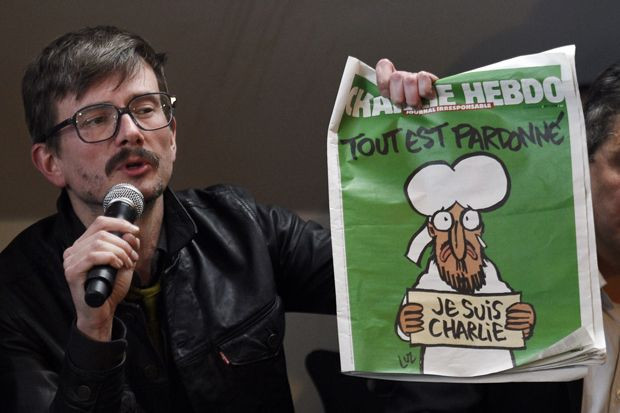Charlie Hebdo Cartoonist Luz To Leave Magazine, Says Absence Of Colleagues ‘Too Much To Bear’

Charlie Hebdo cartoonist Renald Luzier, who drew the French satirical magazine’s cover image after the January attack, said Monday that he is leaving the publication in September as the absence of his colleagues was “too much to bear.” Ten employees of the magazine were killed on Jan. 7 after two Islamist gunmen stormed its headquarters in Paris.
“This is a very personal choice,” Luzier, known by his pen name Luz, said in an interview with French newspaper Libération on Monday, according to Agence France-Presse (AFP). “Each issue is torture because the others are gone. Spending sleepless nights summoning the dead, wondering what Charb, Cabu, Honoré, Tignous would have done is exhausting,” he said, referring to his colleagues. Luz also reportedly said that his departure was not linked to internal tensions at the publication.
The lead editor, Stephane Charbonnier, known by his pen name Charb, who had been under police protection since the magazine was firebombed in 2011, was among the dead.
Luz, who joined Charlie Hebdo in 1992, drew the cartoon of a teary-eyed Prophet Muhammad on the cover, holding a sign that read, "Je Suis Charlie" ("I Am Charlie") and the headline, "Tout Est Pardonne," or "All Is Forgiven." The issue, which hit the stands within days after the attack, had a print run of eight million -- a record for the French publication.
"Many people push me to keep going, but they forget that the worry is finding inspiration," Luz reportedly told the Libération on Monday, adding that while he had thought about leaving the job a long time ago, he "continued in solidarity, to let nobody down. Except that at one point, it was too much to bear.”
Following the attack, French authorities had launched a manhunt for the terror suspects, brothers Saïd and Chérif Kouachi. The men, who had said that they had trained at an al Qaeda camp in Yemen, were killed on Jan. 9 in a standoff with the police. A week after the attack, Nasr al-Ansi, the top commander of al Qaeda in the Arabian Peninsula (AQAP), claimed responsibility for the attack, calling it a "vengeance for the Messenger of God."
Last month, Luz had announced that he would no longer draw the Prophet Muhammad after his satirical cartoons sparked controversies and mixed reactions.
“The terrorists did not win,” Luz told French magazine Les Inrockuptibles at the time, according to AFP. “They will have won if the whole of France continues to be scared.”
© Copyright IBTimes 2025. All rights reserved.





















